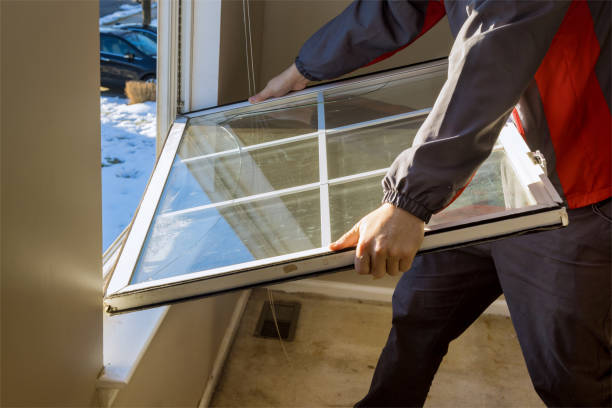Table of Contents
Replacing windows can significantly elevate the comfort, energy efficiency, and aesthetic appeal of your home. This essential guide will walk you through critical insights you need to consider before starting your window replacement project.
1. Assessing Your Window Needs
Before diving into a window replacement project, it’s crucial to assess why you need new windows. Are your current windows drafty, damaged, or simply outdated? Understanding your specific needs will guide your choice of windows. For example, drafty windows usually mean that the seals are broken, which leads to higher energy bills due to inefficient insulation. On the other hand, damaged windows that have cracks or are malfunctioning can be a safety hazard.
2. Choosing the Right Window Type
With myriad window types available, it’s essential to choose the one that best suits your needs and style. Popular options include double-hung, casement, sliding, and bay windows. Double-hung windows are versatile and a traditional favorite, offering ease of cleaning and excellent ventilation. Casement windows, which hinge at the side and open outward, provide clear views and superior airflow. Sliding windows are space-efficient and a good fit for modern homes, while bay windows add a distinctive architectural element. Each type has its pros and cons, so consider aspects like air circulation, ease of cleaning, aesthetic alignment with your home’s architecture, and of course, your budget. Ensuring you choose the right type will make a significant difference in the practicality and look of your new windows.
3. Budget Considerations
Window replacement is a significant investment, and budgeting appropriately is essential for a smooth process. Costs can vary widely depending on the type of window, material, installation fees, and additional features like energy-efficient coatings. Aluminum windows might be cheaper but less insulating compared to vinyl or wood. Energy-efficient windows, while more costly upfront, can offer long-term savings on utility bills. Additionally, consider the cost of professional installation as DIY installations, though cheaper, can sometimes lead to costly mistakes. Factor in potential additional fees for disposing of your old windows and any necessary repairs to the structure around the window frames. Research thoroughly and get multiple quotes to ensure you find a balance between cost and quality.
4. Understanding Window Materials
The material of your new windows can influence their durability, maintenance, and energy efficiency. The most common window materials are wood, vinyl, aluminum, and fiberglass. Wood offers a classic look but requires regular maintenance to prevent rot and warping. Vinyl is more affordable and low-maintenance but might not offer the same aesthetic appeal as wood. Aluminum is robust and low-maintenance but lacks in insulation, often making it less energy-efficient. Fiberglass combines strength and excellent insulating properties but can be on the higher end of the cost spectrum. Understanding the properties of these materials and aligning them with your priorities for durability, maintenance, and efficiency will help in making an informed decision.
5. Energy Efficiency and Benefits
Investing in energy-efficient windows can reduce your utility bills and enhance your home&8217;s comfort. Look for windows with Low-E (low emissivity) coatings, gas fills between panes, and warm edge spacers. Low-E coatings reflect infrared light, keeping heat inside during winter and outside during summer. Gas fills like argon or krypton between panes add extra insulation, and warm edge spacers reduce heat transfer around the edges. ENERGY STAR-rated windows meet rigorous criteria for energy performance and offer a reliable benchmark. Besides cutting down on energy costs, energy-efficient windows contribute to a more consistent indoor temperature, reducing strain on your HVAC system and increasing overall home comfort.
6. Hiring Professional Installers
Proper installation is crucial for window performance and longevity, so hiring skilled professionals is a wise decision. A poorly installed window can lead to drafts, water leaks, and decreased energy efficiency, negating the benefits of even the best windows. Seek recommendations, read online reviews, and verify credentials before hiring an installer. Ask about their experience, whether they offer warranties on their work, and if they handle all aspects of the installation, including removing the old windows and cleaning up after. A professional installer will ensure that windows fit perfectly, operate smoothly, and maximize their lifespan, providing peace of mind and protecting your investment.
7. Preparing for Installation Day
Preparation is key to ensuring a smooth installation process. Begin by removing any window treatments like blinds or curtains and clear the space around the windows, both inside and outside. This helps the installers access the windows easily and protects your belongings from dust and debris. Inform your neighbors about the project, especially if the installation might be noisy or require access to shared areas. Secure pets in a safe area to prevent them from getting in the way or being stressed by the activity. Ensure the installers have clear instructions regarding any specific concerns or preferences you have. Being well-prepared will help the process go quickly and efficiently, ensuring minimal disruption to your daily routine.
By carefully considering these aspects before embarking on your window replacement project, you can ensure a smooth, successful upgrade that enhances your home’s comfort, efficiency, and curb appeal.
